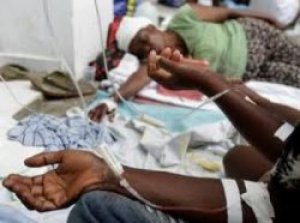A Cholera outbreak has hit Cape Coast and its environs with fourteen out of the 24 cases recorded between Tuesday and Friday at the Cape Coast Teaching Hospital (CCTH), testing positive.
However, one person was brought in dead and had been released to the family for burial.
When the Ghana News Agency (GNA) visited the facility at about 17:00 hours on Friday, other cases were awaiting confirmation.
Isolated tents had been mounted with medical personnel wearing protected gear to manage the disease, which broke out in Accra and other parts of the country about four months ago and had reached an alarming rate.
Mrs. Philomena Afful Mensah, the Disease Control Officer at CCTH, told the GNA that majority of patients who came to the facility were males with the oldest being 68 and the youngest seven years.
She said many of the cases including the dead person were brought in from Kotokuraba, the business centre of the metropolis, and other suburbs of Cape Coast.
She indicated that patients from surrounding towns such as Ankaful, Moree, Ekon and Elmina, were also being rushed there, since according to them, the other hospitals had told them they did not have adequate accommodation to handle their condition.
She said 10 patients had so far been treated and discharged while samples of other patients had been taken to the laboratory to be tested.
The Environmental Health Officer at CCTH, Mr. William H. Quansah said, in order to prevent the spread of the disease, vehicles that brought patients to the hospital were disinfected whiles the driver and relatives of the patients were made to wash their hands thoroughly with soap and other disinfectant before leaving.
He said some of them were given chemicals to disinfect their houses and were also educated on preventive measures.
Mr Quansah said before the dead body was released to the family for burial, it was disinfected and relatives were given some education on how to handle the body.
He underscored the need for people to improve upon their personal hygiene and ensure thorough hand washing with soap and running water as well as keeping their surroundings clean.
Health News of Sunday, 31 August 2014
Source: GNA













